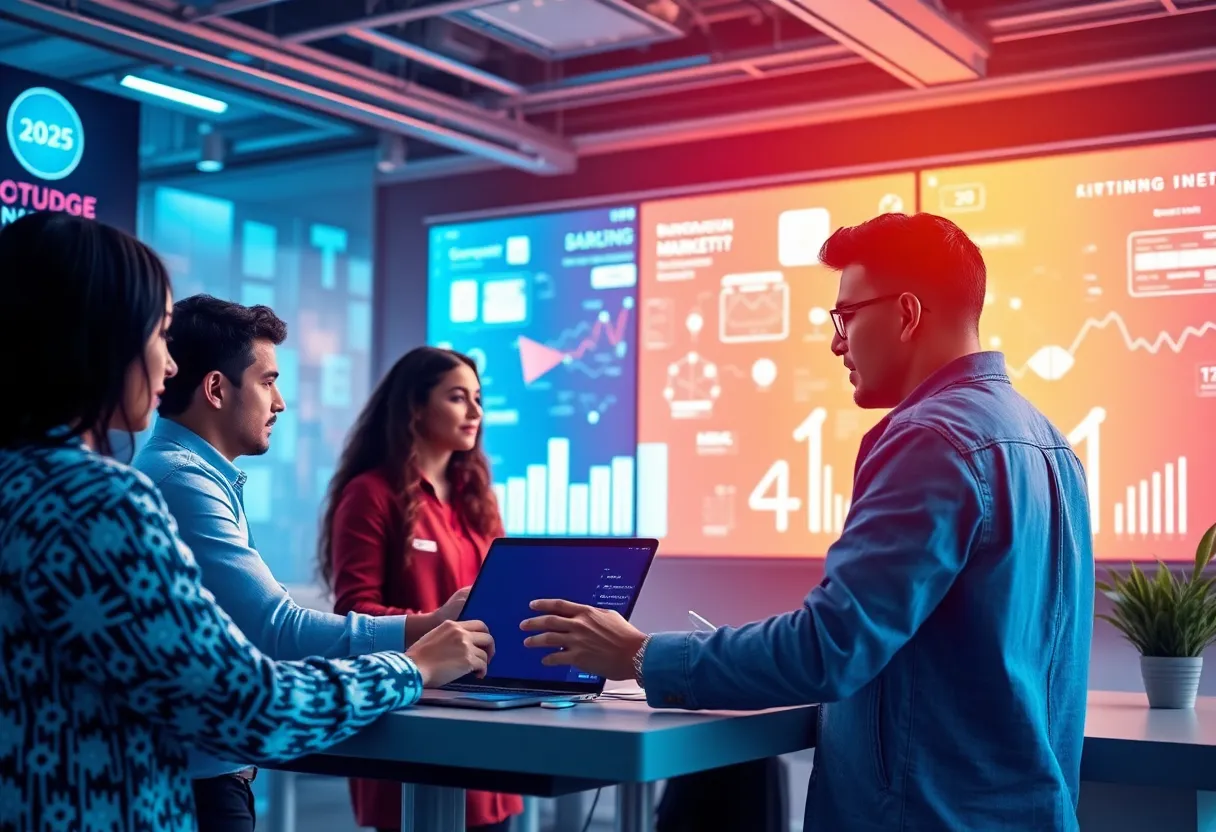

A creative team focuses on brand building strategies while embracing new AI technologies.
Article Sponsored by:
Real Internet Sales is a digital marketing agency located in Columbia, South Carolina. We specialize in website design and development, SEO, social media management, online advertising, AI integration, and workflow automation. Our services also include affiliate marketing and digital strategy.
Real Internet Sales also offer specialized programming for real estate firms, using IDX and RETS feeds to automatically populate MLS properties on their websites for improved property listings and sales. We also work with clients in the restaurant, tourism, and e-commerce industries to enhance their digital presence and streamline operations.
As we approach 2025, the marketing landscape is shifting towards a stronger emphasis on brand building rather than just short-term results. Companies are recognizing the importance of storytelling and differentiation to connect with consumers in a crowded marketplace. The integration of artificial intelligence is transforming marketing strategies, allowing for enhanced campaign optimization and personalization. However, human creativity remains critical in fostering emotional connections with audiences. Marketers are navigating a balance between leveraging AI capabilities and maintaining a personal touch to ensure long-term brand success.
The marketing world is buzzing with exciting changes as we look ahead to 2025. One of the most notable shifts is a renewed focus on brand building, steering away from just short-term results to a more long-lasting value. As markets become more crowded and consumer attention spans dwindle, companies are finding that storytelling and differentiation have never been more important.
As audiences become increasingly disengaged, marketing leaders are realizing that a strong brand can make a significant difference. In a time when countless brands are competing for attention, having an authentic and relatable identity helps companies stand out from the rest. It’s about creating a lasting connection with customers that goes beyond just a purchase.
In the world of B2B marketing, the stakes are even higher! Reinvesting in brand and top-of-funnel marketing is crucial for gaining traction in such a competitive landscape. Marketing leaders are recognizing that strong brand narratives are key to building emotional connections with consumers, especially in a marketplace flooded with AI-generated content.
As we dive deeper into 2025, it’s clear that artificial intelligence (AI) is changing the game in marketing. Businesses are discovering new ways to harness AI, moving beyond basic tasks to tackle more complex challenges such as campaign optimization and real-time personalization. Imagine a world where AI can handle your audience segmentation or analyze competitors while you focus on the bigger picture!
Forward-thinking organizations are expected to embrace agentic AI. This means using AI to drive efficiency and scalability while maintaining a personal touch. By implementing AI into their marketing strategies, companies can increase their capabilities—especially smaller teams—allowing them to manage major marketing functions in smart and seamless ways.
While the potential of AI is exciting, experts are advocating for a more balanced approach. It’s clear that human creativity should not be sidelined amidst these advancements. Tasks like storytelling and strategic decision-making rely heavily on human expertise. Even as AI continues to automate repetitive tasks, the art of connecting with customers emotionally remains a distinctly human skill.
Marketers are encouraged to be thoughtful about their adoption of AI. Are the tools enhancing your existing capabilities, or are they causing more headaches? The aim is to streamline processes without complicating operations. Organizations are doing just that by evaluating their tech stacks, looking for fewer, more comprehensive tools that improve accessibility and cohesion.
As AI takes a more prominent role, businesses are reassessing their approaches toward marketing functions. Should they keep everything in-house, or do certain tasks still require the expertise of external agencies? With AI managing many workflows, it’s becoming more feasible for companies to streamline their operations and reduce external reliance. However, specialized tasks may still be worth outsourcing for greater effectiveness.
All in all, the relationship between traditional marketing and AI is maturing. The demand for strategic human insight continues to rise as marketing teams craft campaigns that resonate with real people. Strong narratives that capture the essence of a brand are becoming more critical than ever. Emotional connections with consumers are built on these value-driven stories.
As we journey towards 2025, the consensus among marketing leaders is evident: to succeed in the evolving landscape, companies need to navigate the dual interests of leveraging AI capabilities while keeping the human touch intact. Embracing both aspects will be key to creating meaningful connections with audiences and ensuring long-term brand success!
Detroit’s Major Infrastructure Development Initiatives
Exciting Changes Ahead in Digital Marketing: Hootsuite’s ‘Social Media Trends 2025’ Report
AI is Taking Over Social Media Marketing!
Survey Data Set to Transform Marketing Strategies
Ann Arbor’s Construction Boom: New Developments by 2025
AI Revolutionizes Marketing Strategies: Here’s What You Need to Know
Revamping Digital Marketing in January: A Fresh Start for Businesses
JW Digital Marketing Shines with 2024 Best of Georgia Honorable Mention
Publicis Media Exchange CEO Joel Lunenfeld Highlights Key Trends Ahead of CES 2025
James Foster Takes the Helm of Global Marketing at Hugo Boss

7001 St Andrews Rd #329 ,
Columbia, SC 29212,
United States
Phone: (+1) 803 708 5514
News Summary Alpena, Michigan is grappling with the aftermath of a severe ice storm that…
News Summary The University of Michigan's Faculty Senate has overwhelmingly supported a mutual defense compact…
News Summary On April 22, 2025, Detroit hosted the third annual MI Healthy Climate Conference,…
News Summary Michigan families are facing a severe child care crisis, with low wages driving…
News Summary Microsoft is implementing stricter performance management policies aimed at improving employee productivity. The…
News Summary President Donald Trump announced he plans to retain Jerome Powell as Chairman of…